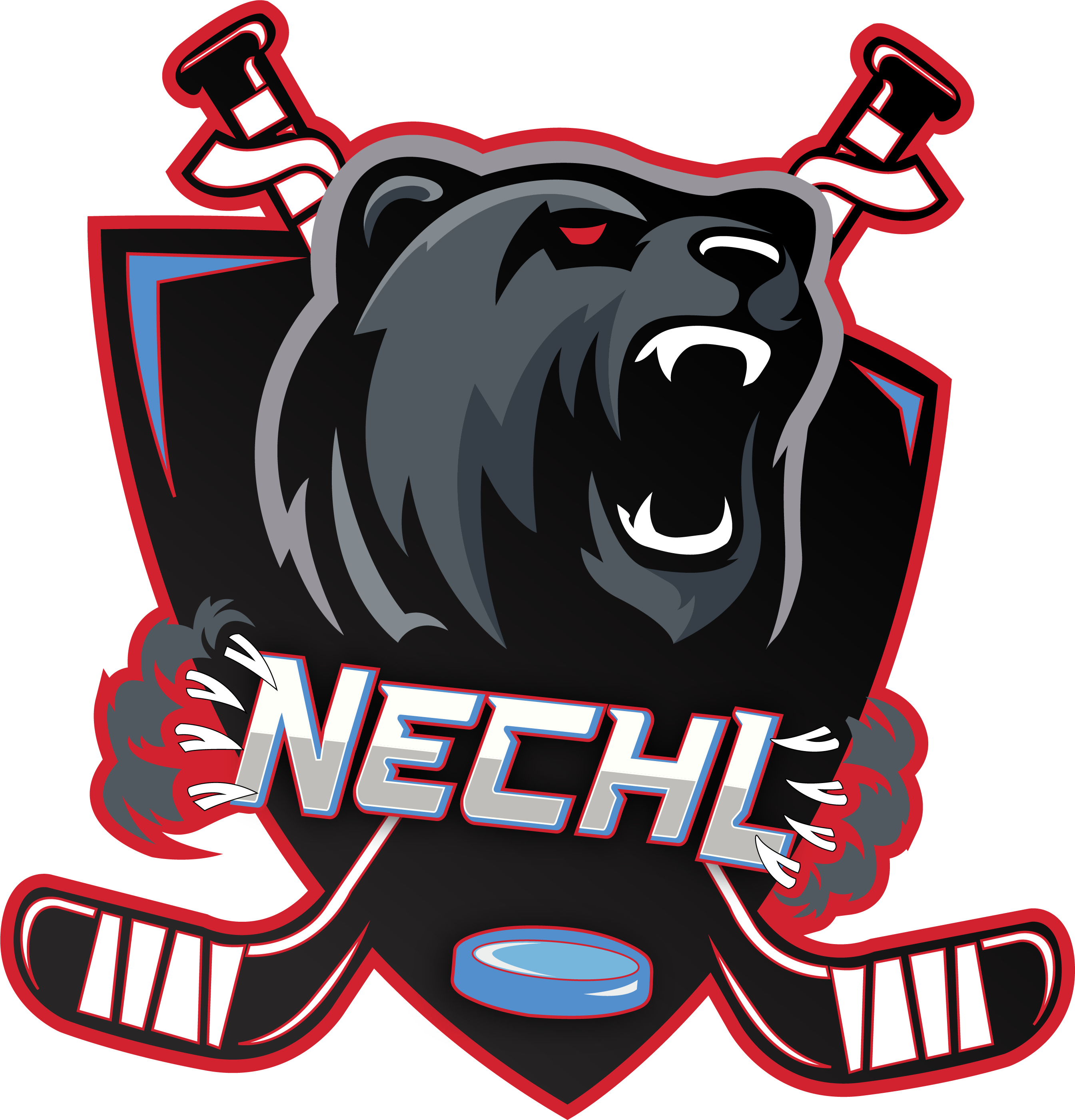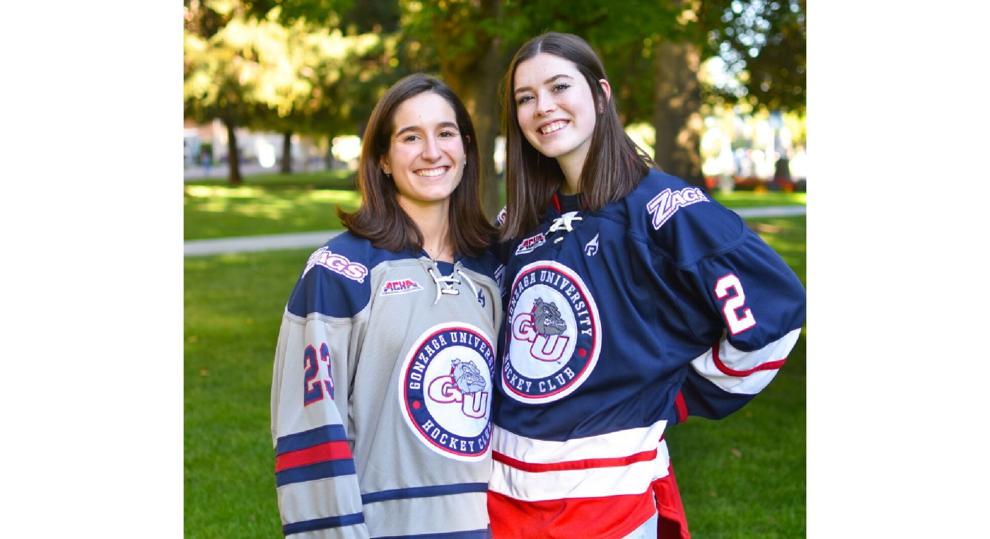From Gonzaga Bulletin
By Noah Apprill-Sokol
What if the glass ceiling we hear about breaking was made of ice? Then surely, Gonzaga University club hockey athletes, senior Skye Clark and junior Leire Corrales, would have shattered it by now. Both are exceptional athletes in their own right, but highlighted even more as the two sole women athletes on a team of men.
From a young age, both Clark and Corrales took to loving the ice, building substantial ice hockey careers for themselves before arriving at GU.
After first playing soccer, Clark, originally from Bainbridge Island, Washington, picked up rollerblade hockey at age 9 and later switched to playing ice hockey in middle school and throughout high school. She began on an all-boys team 45 minutes away from her home in Bremerton, Washington, for a few years and later switched to a couple of all-girls teams that played in a competitive Canadian league.
From San Sebastian in Northern Spain, Corrales came from a family that enjoyed skating. Her two brothers played hockey, and at 10, she began figure skating. When she was 15, Corrales was recruited to play on an all-girls team for her city. She fell in love with the sport and moved away from figure skating to focus solely on hockey, playing on a variety of teams before arriving at GU.
While the ice hockey duo took unique ways to finally get to this sport, they both are grateful that ice hockey is the sport that they have landed upon, both calling the ice hockey rink their home.
“When I had the chance to play hockey, I was immediately like, ‘oh this is so much more fun,’” Corrales said. “I think once I started, I realized that this is what I love, which was skating but in a team and a more fun environment.”
Arriving at GU, Clark and Corrales both struggled to join the club hockey team. The team, which had consisted largely of men and had been branded as such, made it seem that the club was not open to having women play. Clark, who opted to play club rugby during her first year at GU, remembers walking by the ice hockey booth at the GU club fair as a first-year student and talking to a player who said he did not think women were allowed to play.
This changed, however, a year later during Clark’s sophomore year and Corrales’ first year, when senior Brandon Duff, a hockey player who played with Clark when she was 12, reached out to them both introducing them to each other and offering them an opportunity to come to a practice to see if they would want to join.
“I started somewhat out of spite because my family was a huge soccer family,” Clark said. “So, when I saw people playing roller hockey, I was like, ‘my dad will be so mad and it’ll be great.’ But I slowly fell in love with it, really. Switching over to ice hockey, I just loved it and it developed really quickly for me.”
Even after joining the team, the transition to becoming cherished and valued team members was difficult. Clark and Corrales changed in separate locker rooms, making bonding off the ice difficult, and many of their male teammates treated them differently at the beginning. Even their coach when addressing the team would always refer to them separately as the “lovely ladies.” Clark and Corrales depended heavily on each other, especially in the early days, to relieve some of the stress and pressure.
“A lot of them like had [never] experienced playing with a girl on the team before, so they had some adjustment,” Clark said. “Some of the guys were a lot more influential, making an effort to get to know us. But it was hard to bond with the others at first.”
After two years of playing hockey on GU’s club team, Clark and Corrales are both what junior Adrian Osborne, president of the team, calls “one of the boys.” Both are forward wingers with a valuable hockey sense, and Clark is the treasurer and assistant captain for the team. They both bring leadership and a level head to the fun and craziness of the team.
“They bring their positive attitudes,” Osborne said. “They’re always at the practice, and they’re very consistent. They play hard; they do their part. I cannot ask for people to set a better example for what a team player should be than those two.”
While now welcomed members among their teammates, the two have been the victims of a lot of sexist remarks and treatments both from fans and opponents.
In a game against University of Washington, for example, a UW player actively went after Clark, constantly checking her. One of his dirty checks gave Clark a concussion. Corrales remembers a game against Idaho where while on the faceoff line to start the game, a 6-foot-5 male hockey player mockingly asked her if she was able to check him.
Surprisingly, however, Clark and Corrales both agreed that the most sexist attitudes came from not the opponent or the opponent’s fans but from GU fans. These attitudes, coupled with other disrespectful behavior at the rink from GU students, particularly bothered Clark and Corrales, who see the school as being a welcoming and open place. They wanted to emphasize that any disrespect goes counter to the GU mission.
“It is really disappointing because we think of the place as being very progressive,” Clark said. “This is another reason why I feel like it’s so important that we need to carry on having girls on the team just so that we can normalize it and have it not be this big deal anymore.”
Although it is difficult to play on a majority men team and compete against all-men teams, their determination to play stems from their love for the sport and a responsibility to inspire other women to break through the ice and play hockey. Both Clark and Corrales hope that by playing they can inspire other young girls to fall in love with the sport and play hockey.
One heartfelt moment related to women playing in hockey for Clark and Corrales came after a tournament game in Winthrop, Washington, when a young girl came up and asked them to sign her puck. The girl’s mother explained to them that this was the first time that the girl had seen older women playing hockey.
“That was cool because you’re like, ‘oh maybe I had a small influence on this girl’s life. Maybe she can see that she can continue playing hockey and that she can go to college and play hockey on a coed team,'” Corrales said. “There’s not a lot of women playing hockey. So just the fact that we represent that is important.”
In an attempt to cement the legacy of the team being coed and to ensure that the ice stays broken, Clark and Corrales are trying to get other women athletes to join the GU club hockey. For them, the joy that they found on GU hockey needs to be shared to all, not just to men. To anyone interested in playing hockey, Clark and Corrales hope that they take the risk and join.
“I love being part of the team,” Clark said. “It’s so much more than just what we do on the ice, what we do in practice or in games, or even like conditioning. It really is like a family. We’ve made such good friends with the guys and with each other, and we wouldn’t have had this if we hadn’t taken the risk to join the team. ”
The first game of the season will be on Oct. 1 at 9:15 p.m. at the Eagle Ice Arena.
(Originally published at https://www.gonzagabulletin.com/sports/breaking-the-ice-clark-and-corrales-on-playing-on-a-male-hockey-team/article_8903b664-1fd2-11ec-b893-bfdc70bff7af.html)
































